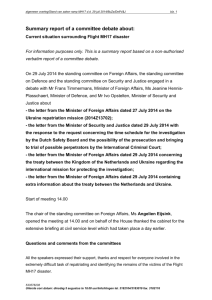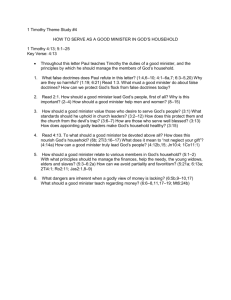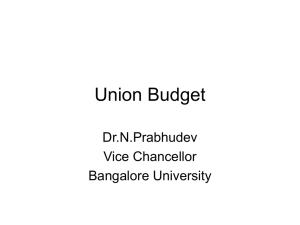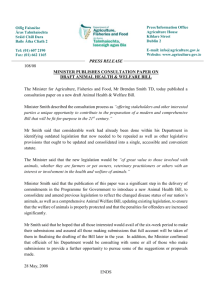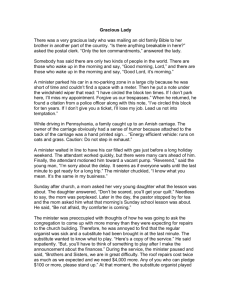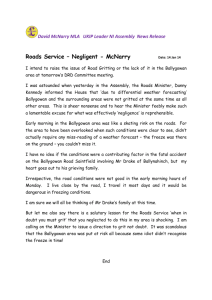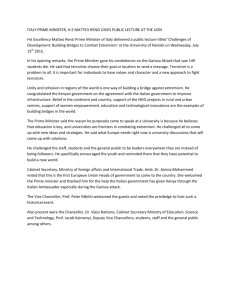Algemeen Overleg - House of Representatives of the States
advertisement
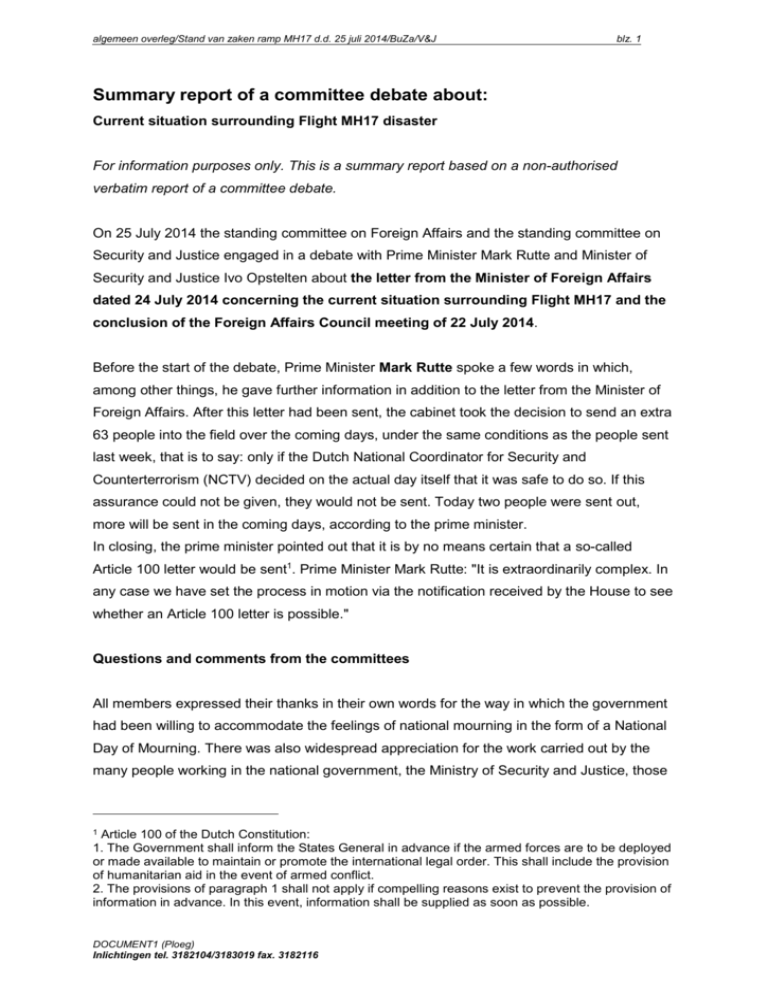
algemeen overleg/Stand van zaken ramp MH17 d.d. 25 juli 2014/BuZa/V&J blz. 1 Summary report of a committee debate about: Current situation surrounding Flight MH17 disaster For information purposes only. This is a summary report based on a non-authorised verbatim report of a committee debate. On 25 July 2014 the standing committee on Foreign Affairs and the standing committee on Security and Justice engaged in a debate with Prime Minister Mark Rutte and Minister of Security and Justice Ivo Opstelten about the letter from the Minister of Foreign Affairs dated 24 July 2014 concerning the current situation surrounding Flight MH17 and the conclusion of the Foreign Affairs Council meeting of 22 July 2014. Before the start of the debate, Prime Minister Mark Rutte spoke a few words in which, among other things, he gave further information in addition to the letter from the Minister of Foreign Affairs. After this letter had been sent, the cabinet took the decision to send an extra 63 people into the field over the coming days, under the same conditions as the people sent last week, that is to say: only if the Dutch National Coordinator for Security and Counterterrorism (NCTV) decided on the actual day itself that it was safe to do so. If this assurance could not be given, they would not be sent. Today two people were sent out, more will be sent in the coming days, according to the prime minister. In closing, the prime minister pointed out that it is by no means certain that a so-called Article 100 letter would be sent1. Prime Minister Mark Rutte: "It is extraordinarily complex. In any case we have set the process in motion via the notification received by the House to see whether an Article 100 letter is possible." Questions and comments from the committees All members expressed their thanks in their own words for the way in which the government had been willing to accommodate the feelings of national mourning in the form of a National Day of Mourning. There was also widespread appreciation for the work carried out by the many people working in the national government, the Ministry of Security and Justice, those 1 Article 100 of the Dutch Constitution: 1. The Government shall inform the States General in advance if the armed forces are to be deployed or made available to maintain or promote the international legal order. This shall include the provision of humanitarian aid in the event of armed conflict. 2. The provisions of paragraph 1 shall not apply if compelling reasons exist to prevent the provision of information in advance. In this event, information shall be supplied as soon as possible. DOCUMENT1 (Ploeg) Inlichtingen tel. 3182104/3183019 fax. 3182116 algemeen overleg/Stand van zaken ramp MH17 d.d. 25 juli 2014/BuZa/V&J blz. 2 serving in the various branches of the armed forces, the emergency workers and everyone else who played a role in achieving the objectives of the government. Mr Ten Broeke (People's Party for Freedom and Democracy - VVD) said that our first priority now must be to ensure that all the bodies of the victims are recovered, that their personal belongings are returned and that evidence as to the cause of the crash must be gathered. Those responsible, as well as those indirectly responsible, those who have incited stirred up and fuelled the conflict in eastern Ukraine, will find out that the Netherlands, Europe and the world at large will impose consequences for their actions. Mr Ten Brooke then asked a number of questions. Is the chosen solution a direct consequence of the agreements made yesterday by Mr Timmermans in Kiev, including those made with the Ukrainian authorities and the OSCE, who are in turn in contact with the separatists? Is the Netherlands working internationally on a more solid solution, in which it might be possible to secure the entire crash site? Is this solution, sending in 40 unarmed military police officers and 23 investigators, the best solution right now for realising the goal – recovery of the bodies – without becoming a part of the conflict? What is the cabinet’s assessment of the situation on the ground right now? Have agreements been made with the authorities in Kiev, with the OSCE and possibly also with the separatists, to ensure that the investigators and military police officers can carry out their tasks unhindered? Are these the same agreements under which the Australians and Malaysians are carrying out their work? Their task – search and retrieve – is clear, but is their mandate also clear? For example, is there any difference between military and civilian personnel at the crash site? If the safety situation should escalate, how will the Dutch people who have been sent into the area operate? Mr Servaes (Labour party - PvdA) said that his party continues to support the priorities set by the cabinet immediately following the disaster, namely the repatriation of the victims' bodies, investigating the cause of the crash and bringing the perpetrators of this terrible crime to justice. Mr Servaes focused his questions on two issues: the repatriation of the bodies of the remaining victims and the relationship with Russia and the sanctions discussed in Brussels. DOCUMENT1 (Ploeg) Inlichtingen tel. 3182104/3183019 fax. 3182116 algemeen overleg/Stand van zaken ramp MH17 d.d. 25 juli 2014/BuZa/V&J blz. 3 Can the prime minister say anything about the various scenarios being worked on at the moment? What agreements have been made with Ukraine, with the separatists, with Russia, with international organisations and with other countries? What does this mean for the risk analysis concerning the activities of Dutch people in the area itself? What is the position on the possibility of arming the military police after all? Is there an exit strategy? Has the possibility that people may need to be liberated been considered? How is the phasing on the various steps organised? Will the military police be able to commence work in the coming days, or are we waiting until the complete picture is available and we know what security cover needs to be provided? Will we only be sending people into the area once this is known? Are any alternatives being considered? Has an expansion of the mandate of the existing OSCE mission been discussed, in Vienna, the Ukraine or elsewhere? The European ministers of Foreign Affairs met together and expressed their unity, but does this unity still exist? What does the Netherlands hope to achieve exactly using sanctions? Does the prime minister feel it may be necessary to summon an extra European summit to keep up the pressure? If the decision is made to impose sanctions, how far is the Netherlands prepared to go? Mr Van Bommel (Socialist Party - SP) asked the following questions: Can the prime minister confirm that Malaysian and Australian emergency workers have already been carrying out investigations on site? Why was this? Are all the countries involved carrying out their own analysis to determine whether it is safe to send in their own people? Fighting is still taking place in the Donetsk area. What consequences does this have for the safety of emergency workers, forensic specialists and the OSCE? Is a ceasefire now in force? Will there be a cease-fire? What agreements have been made about this between Ukraine and the separatists? How much are agreements with the separatists worth if there is no cohesion between the various armed groups? Is the deployment of 40 unarmed military police officers based on Resolution 2166? What is being done to guarantee their safety and what risks does their task involve? DOCUMENT1 (Ploeg) Inlichtingen tel. 3182104/3183019 fax. 3182116 algemeen overleg/Stand van zaken ramp MH17 d.d. 25 juli 2014/BuZa/V&J blz. 4 Is it true that the Netherlands is working with Australia on a second resolution to allow an armed police or military presence in the area? How much support is there for this? Is it true that all flights over eastern Ukraine have now been diverted? How large is the no-fly zone? Is it true that relevant intelligence did not reach the Netherlands and Malaysia, which is why the decision to fly at alternative route was not considered? Does the Dutch government share the American government’s conviction that Russia is continuing even now to supply arms to the separatists? And what consequences does this have for sanctions? Does the government share the opinion that under the circumstances all arms exports to Russia should be suspended? Have calls for this been made in a European context? Mr Omtzigt (Christian Democratic Appeal - CDA) asked the following questions: It is good that the Russians are participating in the investigation into the disaster, because the results must be acceptable internationally. Is the option of involving the International Criminal Court being kept open? As Ukraine and Malaysia are not members, they would have to submit a request under Article12. Is this under consideration? Is there any guarantee that the entire findings of the investigation by the combined investigation team will provide valid input for any kind of criminal prosecution? Can the Netherlands appeal to the USA and Russia to make public the satellite and radar images held by these countries? Is an investigation being carried out into the reason why the aircraft flew over Ukraine and how western countries communicated with each other concerning the risks? Particularly in the light of the fact that aircraft were downed using SAM rockets on 2 and 14 July. This morning, separatist Kavtaradze stated in the press that there are snipers located in the woods surrounding the crash site. What are the consequences of such reports and how are they weighed? What action is the cabinet considering, a mission at the invitation of Ukraine or a mission via the UN Security Council? Mr De Roon (Party for Freedom - PVV) reiterated the words of the prime minister: “The Netherlands will not rest until an independent international investigation into the cause of the DOCUMENT1 (Ploeg) Inlichtingen tel. 3182104/3183019 fax. 3182116 algemeen overleg/Stand van zaken ramp MH17 d.d. 25 juli 2014/BuZa/V&J blz. 5 disaster has been carried out and any perpetrators brought to justice." He welcomed the fact that steps are now being taken to speed up the investigation in the disaster area, and asked the following questions: Have the separatists let it be known that the unarmed military police officers are welcome to carry out their task? Have they set any conditions for this, and if so, what? Is there sufficient response time to withdraw our people safely if necessary? Is it true that two jets have been downed by missiles fired from Russian territory? Can the government inform the House concerning reports that Russian troops are moving towards the border again? Is it true that intelligence services from France and other countries had information concerning the danger of missiles in the hands of rebel forces but that they did not share this information with the Dutch intelligence and security service? Mr Sjoerdsma (Democrats 66 - D66) put the following questions to the cabinet: How is the cabinet working to repatriate the remaining bodies and the personal belongings of the victims? Why has the cabinet chosen to send unarmed military police officers into a war zone? What will happen if they find themselves in a situation of violence? What is the Netherlands’ intelligence position at the site? What safety guarantees has the cabinet negotiated? Has a deal actually been struck with the separatists? What different options are being explored to support the investigation? Is it true that commandos are being deployed this weekend and is a UN resolution being worked on that would make such an action possible? What role do countries such as Australia play in this action? In the meantime, what is being done to ensure the security of the crash site and the safety of the investigators? Does the prime minister share the opinion regarding Russia that justice must prevail and that principles are more important than other interests? Does the prime minister share the analysis of his British colleague David Cameron who holds Putin responsible for creating the conditions under which MH17 was downed? The European Union is accelerating the previously agreed sanctions against Russia and preparing new sanctions, but as yet no real action has been taken. When will the DOCUMENT1 (Ploeg) Inlichtingen tel. 3182104/3183019 fax. 3182116 algemeen overleg/Stand van zaken ramp MH17 d.d. 25 juli 2014/BuZa/V&J blz. 6 government leaders be meeting to discuss new sanctions and possibly even implement them? How far is the cabinet prepared to go in this? Mr Segers (Christian Union) stated that his party endorses the aims and the priorities of the cabinet but has many questions about the choice made. With what mandate are the 40 military police officers being sent to the disaster area? Is this permissible without an Article 100 letter? What could be done in a follow-up mission that these military police officers cannot do at present? Minister of Foreign Affairs Mr Timmermans said that the mission is legally in order. What mission was he referring to here? Is it possible for Russia to avoid sanctions if the country takes a different line to that which it has adopted up to now? A consultation will be taking place in Eurojust concerning the international investigation into the cause of the disaster and the perpetrators. The minister of Security and Justice has stated that a national criminal investigation is preferred and should be the first step. What are our international options at the International Criminal Court and Eurojust? In the case of the Lockerbie disaster a separate criminal court and a special mandate were instituted. Could this be an option for this complex situation? What efforts are being made to stop the war in Ukraine? Ms Van Tongeren (Green Left party) would like to receive more information from the cabinet about the scenarios for creating a stable situation at the disaster site and the phasing of such scenarios. Premature assignment of blame could possibly lead to access to the crash site being obstructed, but waiting a long time to explore the question of guilt is also unsatisfactory and in fact wholly unacceptable. How do the cabinet and the international community view this dilemma? Does everyone flying from Schiphol today know for certain that they will not be flying over this conflict area, or any other conflict area in the world? Is the information from the intelligence services being shared from now on, so that airlines can plan other routes? Will sanctions be imposed on banks in the hands of the Russian government? How are consultations in Brussels concerning sanctions progressing? DOCUMENT1 (Ploeg) Inlichtingen tel. 3182104/3183019 fax. 3182116 algemeen overleg/Stand van zaken ramp MH17 d.d. 25 juli 2014/BuZa/V&J blz. 7 Mr Van der Staaij (Reformed Political Party - SGP) commented that all the talks with the victims’ next of kin show the incredible importance of good communication, and this will also be sure to play a role in the questions that are sure to arise during the identification of the remains. He expects and trusts that full attention is being paid to this and that questions from the next of kin will be answered promptly and properly. He went on to ask the following questions: Is there consensus about the degree of safety in the area required for a good investigation? Is their clarity about the actual safety situation in the area? Why are the military police officers being sent into the area unarmed? What concrete behaviour is being required from Russia and what pressure is being brought to play on Russia to achieve this? Ms Ouwehand (Party for the Animals - PvdD) said that her party is concerned about the preparations the cabinet seems to be making for sending a police mission to the area, and asked the following questions: Is it a sensible idea to send a military presence to an area that is known to be a political hornet’s nest? Military plans should not be made on the basis of feelings of anger, grief and powerlessness. How should an attack on Dutch soldiers or police officers be seen in terms of the NATO charter and how is the cabinet weighing up the risks of escalation and its consequences? Mr Bontes (Group Bontes/Van Klaveren) felt that the cabinet should still send a strong mission. The scene of the disaster must be investigated and this investigation must be able to take place safely. For this reason Mr Bontes advocated the deployment of special forces. Is the report in a Dutch newspaper correct that says that this weekend Dutch special forces are being dispatched to eastern Ukraine? If this is indeed so, do we have enough transport helicopters available for an evacuation should this be necessary? And are there enough attack helicopters available to provide the necessary air support? Is the cabinet prepared to invest in Defence once again, in the interests of Dutch security? Prime minister Mark Rutte echoed the compliments of the House for all the efforts of the military, Defence, police and everyone else involved, such as those now working in DOCUMENT1 (Ploeg) Inlichtingen tel. 3182104/3183019 fax. 3182116 algemeen overleg/Stand van zaken ramp MH17 d.d. 25 juli 2014/BuZa/V&J blz. 8 Hilversum to identify the remains, those working in Kharkiv or Kiev or the embassy there and those already present at or on their way to the crash site to carry out further investigation. The repatriation of all the victims remains top priority, both for the House and the cabinet, because the condition of the remains is deteriorating with every day that passes. For this reason the cabinet has increased the capacity to 63 people. This number could increase. The 40 military police officers on site are in fact not acting in their capacity as military police, but to assist in the search and recovery. They have exactly the same task as the other 23 team members. The government could equally well have asked firemen or others, said the prime minister. The military police were asked because they are rapidly deployable. They are excellently trained and very well able to help the forensic experts in their search for human remains and the personal possessions of the victims. The clothing worn by the military police has been specially chosen so as not to provide any provocation whatsoever to those in the area who are of the opinion that they are in authority. The question is how often these people can be deployed. Although the separatists have indicated that they see the importance of the work being carried out on the crash site, this is not a safe area. For this reason the National Coordinator performs a daily safety assessment based on input from the OSCE, the Dutch intelligence services and other sources. It is an extraordinarily complex task to bring the activities on site into a more stable phase, the so-called Phase 2. The option of deploying a military presence requires extremely careful consideration of the geopolitical consequences; the possible provocation of those who have assumed authority in the area and the risk of additional loss of life play a role in these considerations. The prime minister responded with extreme caution to reports in the media that the military could be deployed as early as this weekend and said that it is far from certain that a Phase 2 could be reached: “We are faced with a large number of geopolitical issues. We are dealing with a mandate under international law. At this very moment the UN Security Council is examining all the options available." The prime minister stated that President Poroshenko and his staff are offering their full cooperation. Given the proximity of the Russian border, a second phase in which it is possible to work with more stability, is unthinkable without Russian consent. In the present context there is no Phase 2. There is still no Article 100 letter, and this may not be forthcoming, depending on the outcome of the various negotiations. In the present context a new safety assessment needs to be made each day. Concerning this, the prime minister said: “If we do not succeed in proceeding to Phase 2 and we remain in this phase, that does not mean we will stop. We will continue to do what we are doing now. We will continue with the recovery of our people, because that is our absolute top priority. Now we are working within the context as it is and trying to create a more stable context in Phase 2. But if that does not succeed, we will continue in this context." In the prime minister’s opinion, the DOCUMENT1 (Ploeg) Inlichtingen tel. 3182104/3183019 fax. 3182116 algemeen overleg/Stand van zaken ramp MH17 d.d. 25 juli 2014/BuZa/V&J blz. 9 Netherlands must take up its responsibility in this case, considering the large number of Dutch victims, but he gave the House the following assurance: “If on any given day conditions are too dangerous, work will be suspended for that day. We will not take any unnecessary risks." The prime minister also emphasised the fact that the decision on whether or not it was safe to work on a given day is the responsibility of the NCTV. At the moment both sides have suspended fighting, since Monday 21 July, although there is no formal cease-fire. This informal cease-fire on site is fragile, but has held since last Monday. The Dutch are working under the flag of the OSCE within the framework of the OSCE mission already present. Contacts with the separatists take place via the OSCE. However, there continues to be risk involved in the work as this is a region in which the separatists and the Ukrainian authorities are fighting each other. There is no capacity for extraction. If the conclusion was reached that work could only continue if there was no risk, that is to say in a Phase 0, we would have to stop the work now. That would mean it would no longer be possible to search further for human remains. The separatists have indicated that all experts are welcome. They want to see the search for human remains and personal belongings finished as soon as possible. They are aware that they need help for this, and are keen for the Netherlands to assist. The government is doing all it can in the present context to achieve its first priority, the repatriation of all the victims, and is exploring ways to make this possible in more stable circumstances. However, the prime minister pointed out once again that it is far from certain that this will succeed. It is important to take great care to build coalitions with all the parties involved. The Netherlands is working extremely intensively with Australia. Malaysia also feels very closely involved. However the Australians are also unable to enter the area with small arms. This is quite simply not permissible within the present context. In any case it is not possible to be active in the area without Russian consent. And because this is Ukrainian territory, permission must be given by the Ukrainian government. There is also the question of how to act upon UN Security Council Resolution 2166 in the mandate under international law. Intensive talks are progressing on all these fronts right now. A Memorandum of Understanding has been agreed with Ukraine for the Netherlands to lead the investigation and for the forensic examination to take place in the Netherlands. We are now conducting talks with the Ukraine on how we can ensure that the Netherlands will be given and maintain a leading role in Phase 2 of the investigation, Mr Rutte said. When asked, the prime minister stated that the crash site is of course on Ukrainian territory and that formally speaking the Russians have no authority there. However, there are strong indications of Russian influence on the separatist rebels active in the region. This is why the DOCUMENT1 (Ploeg) Inlichtingen tel. 3182104/3183019 fax. 3182116 algemeen overleg/Stand van zaken ramp MH17 d.d. 25 juli 2014/BuZa/V&J blz. 10 prime minister is in contact with the Russian president, to ask him to exercise his influence on the separatists to the maximum. Because Ukraine is not a member of NATO, Article 5 of the NATO Charter does not apply. The prime minister then gave an overview of the sharpening of the existing sanctions decided in Brussels. As far as defence goes, the ambition is to reach a weapons embargo. The Netherlands is in favour of this, but whether it will come to this is impossible to say with any certainty because talks are still taking place regarding the different types of sanctions and their further escalation. The ambassadors will be meeting next Tuesday to discuss this further. This could lead to an extra meeting of the European Council. The prime minister said that he recognised the special significance of an extra European Council, but had the following reservation: “In this case the Council must come to a conclusion. It would be terrible if the European Council was called together and did not come to a conclusion." There are three possible reasons for sanctions. The first applies if it turns out that Russia was behind the downing of the aircraft. According to the prime minister, there is presently no proof whatsoever to support this. Another reason for sanctions could be if Russia fails to cooperate in securing the crash site, but at the present time Russia is attempting to exert serious influence on the separatists in the area to ensure access to the crash site. The third reason for sanctions is a serious contender, namely the fact that there are all kinds of indications that Russia is continuing to supply arms to the separatists. This trigger for sanctions is currently being considered. The Dutch government feels it is very important that these sanctions are put into effect if it turns out that Russia is continuing to supply the separatists with arms and does not distance itself from the separatists. The prime minister emphasised that this is the Dutch commitment, but he was not certain that a European consensus had been reached on this, saying: “The Netherlands has all kinds of opinions, but also wants to use its special moral obligation as a country as a consequence of this terrible air disaster to bring Europe into one line.” He also stated that sanctions are only effective if the international front behind them is as broad as possible. Images are available of the downing of jet fighters. It is obvious that fighting is continuing between separatists and Ukrainian troops, but the Dutch government has no information as to whether shots are being fired from Russian territory. An expansion of the OSCE mandate is currently out of the question. The mandate is focused on monitoring. The role is mediation, to allow direct, unobstructed access. To achieve this, the OSCE has spent the last months establishing all kinds of contacts with separatists and other parties. At the same time this requires a daily assessment of the situation by the OSCE itself. DOCUMENT1 (Ploeg) Inlichtingen tel. 3182104/3183019 fax. 3182116 algemeen overleg/Stand van zaken ramp MH17 d.d. 25 juli 2014/BuZa/V&J blz. 11 Minister Opstelten of Security and Justice also started by recalling the Day of National Mourning, which was very moving. The crisis team is continually focused on the next of kin of the victims. The minister underlined the importance of good communication with the next of kin. Aftercare is also very important, not just now but also in the long term. The Dutch Safety Board is investigating the circumstances of the disaster – what happened, what was the flight path and who did what? – but is not assigning any blame. The experts are carrying out their work. The Dutch delegation of four people from the National Forensic Investigation Team and others have currently returned to the crash site. Ukraine has offered the Dutch Safety Board the opportunity to assume the leadership of the investigation. Besides the Netherlands, the USA, UK, Australia, Germany, France, Malaysia, Ukraine and even Russia are participating in the investigation, as it is important to have a broad international investigation. There are 24 investigators in Kiev and eight in London for the analysis of the data from the black boxes. These investigations are carried out at their own responsibility and of course they report independently to the Dutch authorities. Another priority is to ensure that the data from the investigation are available for the criminal investigations. The next of kin have the right to clarity concerning the circumstances of the disaster and the prospect of those responsible being brought to justice. Moreover, it is important that the Netherlands sends out an international signal that it protects its subjects from serious crimes. As soon as news of this terrible disaster became known, the Public Prosecution Service came into action and assumed leadership. On Monday 28 July a meeting of Eurojust will take place in The Hague which will include colleagues from all countries that have incurred victims. During this meeting concrete measures will be discussed. Will the Netherlands be prosecuting? The Public Prosecution Service is working towards this. The cabinet assumes that prosecution will take place on a national level, as neither Malaysia nor Ukraine are State Parties to the International Criminal Court. The Dutch Public Prosecution Service is leading the investigation. A Lockerbie Construction could be considered separately, but is not an obvious step. Data that becomes available from the investigation into the circumstances will also be made available for the criminal investigation. Clear agreements concerning this have been made with the Dutch Safety Board. Must all the facts be made public? Yes, but this should be done by the Dutch Safety Board. Moreover, the Public Prosecution Service determines for itself when it will issue facts surrounding the investigation. This is how the justice system works, nationally and internationally. DOCUMENT1 (Ploeg) Inlichtingen tel. 3182104/3183019 fax. 3182116 algemeen overleg/Stand van zaken ramp MH17 d.d. 25 juli 2014/BuZa/V&J blz. 12 Some of the victims’ personal possessions have been brought to Kharkov, but many belongings of the disaster victims have not yet been recovered. Unfortunately, there are also reports that victims’ belongings have been taken away. The search team has been tasked with doing all it can to recover these possessions. The circumstances in which Flight MH17 was downed and the information position of Malaysian Airways prior to the flight are currently being investigated by the Dutch Safety Board. The government is awaiting the result of these investigations. The Dutch Safety Board will investigate all the circumstances of the disaster, including the reason why the flight flew over Ukrainian airspace. Airlines are individually responsible for the safety of their flights. The airlines themselves determine which airports they fly to and which routes are used. As far as we can tell, prior to 18 July not one international aviation authority or intelligence and security service had issued an official advice to avoid Ukrainian airspace, the minister said. Airlines that chose not to fly over Ukrainian airspace, such as British Airways, used their own judgement for this. Until further notice the advice of the Dutch government is to not fly over eastern Ukraine. EUROCONTROL informs airlines about the situation, for example that in Israel and Libya, as their location means they have an impact on the European network. The final decision is always up to the airlines themselves. Close 12.38. DOCUMENT1 (Ploeg) Inlichtingen tel. 3182104/3183019 fax. 3182116
